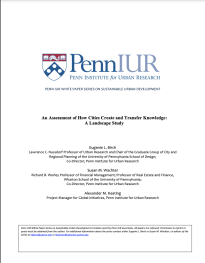Key Message
The successful transfer of best practices in urban development hinges on effective knowledge sharing among diverse actors, including multilateral organizations, governmental agencies, private sector entities, and grassroots networks. The study underscores the shift towards South-South knowledge transfer and the growing role of private sector and philanthropic actors in urban sustainability. It emphasizes the need for coordinated efforts to bridge knowledge gaps and promote comprehensive urban strategies that integrate economic, environmental, and social dimensions. The report identifies three core research gaps: the dynamics of North-South and public-private partnerships, the need for comprehensive best practices that address all aspects of sustainable urban development, and the barriers to adoption in the urban public sector. To advance sustainable urban development, it is essential to foster inclusive knowledge networks, support interdisciplinary collaboration, and develop adaptive dissemination methods that respond to local contexts and challenges.


